Reflecting on RADICAL - 4+ years of research project management
(1).png)
Since the inception of UCC Academy in 2014, we have supported our colleagues in UCC community with research project management. To date we have supported the submission of 18 successful research proposals. Of those 18 projects, we have supported 10 projects post-award as both project managers and communication managers.
One of these projects, RADICAL, recently submitted its final report to the project funders. Dr Tamela Maciel had the pleasure of being the RADICAL Project Manager since the first kick-off meeting in November 2020. As the project ends, Tamela reflects back on the journey of this mighty little project through the lens of research project management.
What is RADICAL?
An electronic nose for air pollution
“RADICAL is a Horizon 2020 EU research project to develop a low-cost electronic sensor for air pollutants such as free radicals, ozone, nitrogen dioxide and ammonia. It's considered a high-risk, high-reward type of project and no one really expected it to be funded (in fact the first two attempts weren't!), but in March 2020, just as the whole world was put on pause due to COVID-19 , the project coordinator Professor Justin Holmes (UCC School of Chemistry) got the good news – RADICAL was funded to the tune of €3.2million. UCC Academy had worked with Justin to shape the third proposal, with a particular focus on high-impact communications, dissemination and commercialisation of the research results.”
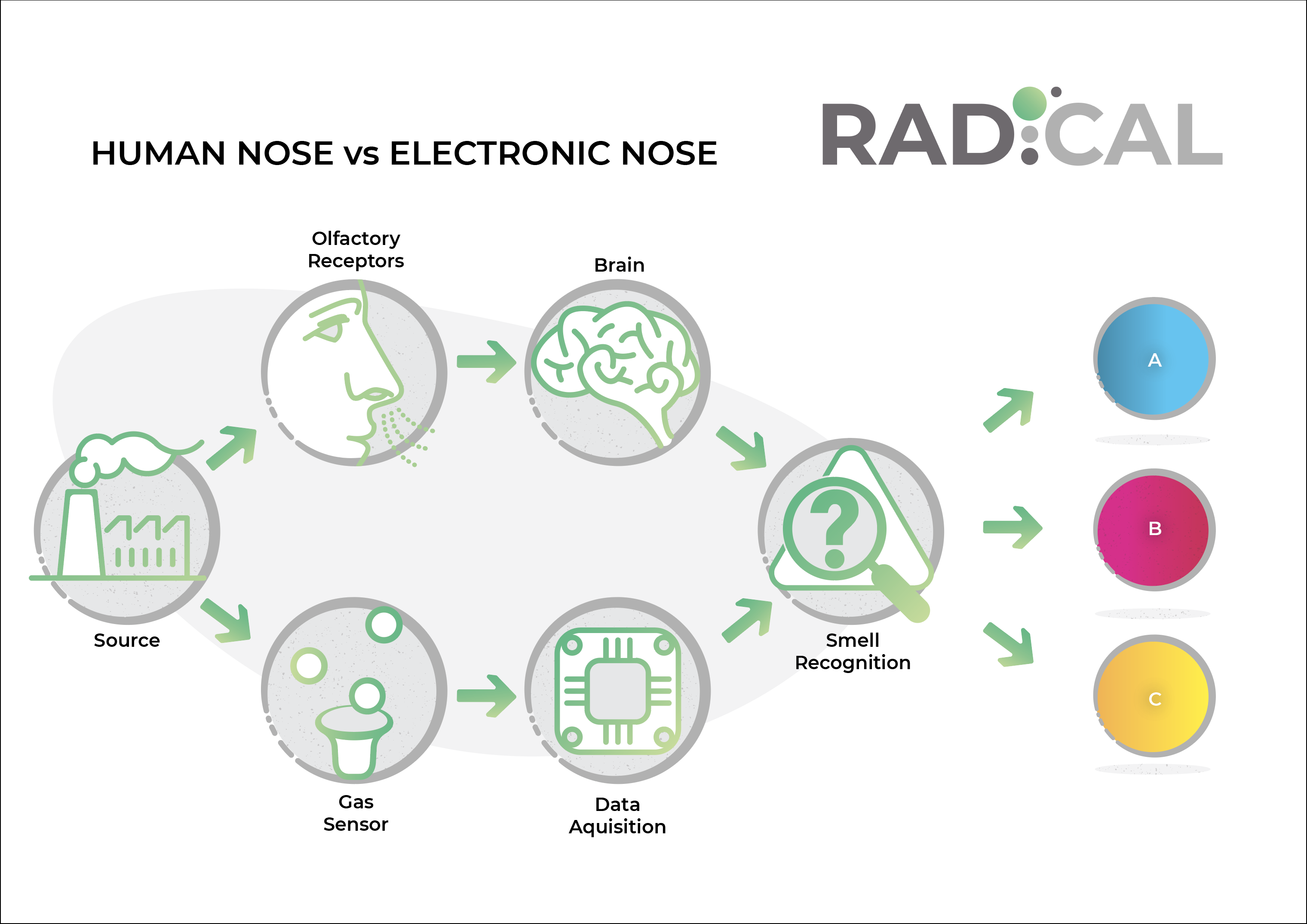
Credit: RADICAL. Graphic design: Jonathan Leahy Maharaj, UCC Academy
Kicking-off
“I joined UCC Academy as the RADICAL project manager just two days before the project kick-off meeting in November 2020 (online of course), and the next 1.5 years were a blur of endless lock-downs, lab closures, hiring freezes and online meetings. But some of my most rewarding memories are from this first year. I led the Communications and Dissemination Work Package, as well as Project Management, and I launched into the project branding, website development and social media content with zeal, bringing along my research team for the ride. The combination of early project enthusiasm and lack of lab access meant that I was able to persuade many colleagues, both senior and junior, to write guest blogs, film videos, develop infographics and so on, in a way that never quite materialised later once the real research began. I also organised a series of science communication trainings for the team with my fellow Academy videographers and writers – and the RADICAL researchers gamely gave it a go. In hindsight, we had so much time in that first year!”
Importance of in-person meetings
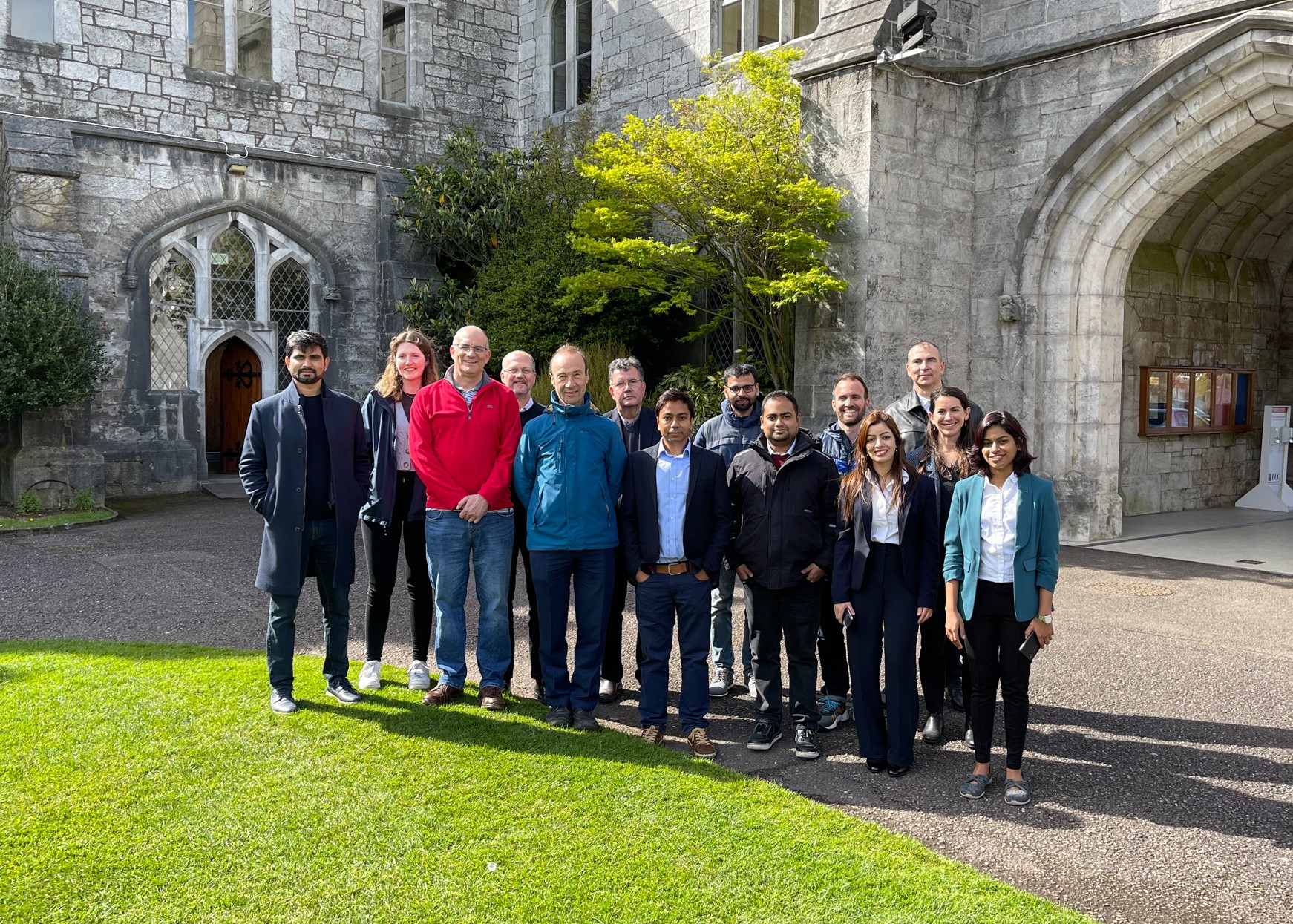
RADICAL consortium in Cork, April 2022
“Finally, in April 2022, we were able to organise our first in-person project meeting here at UCC. It wasn't until we had in-person meetings back that we realised how much we had gone without. In-person meetings are essential to a successful project. Challenges that seemed insurmountable online due to lack of personal connection floated away as friendships formed and people offered solutions, advice and time. Personally, I always notice how much more responsive the team is to my emails just after an in-person meeting! A few years later, in January 2025, we had a last project meeting and asked for feedback on what went well and what could have been improved. The main suggestion? More in-person meetings early in the project and more lab exchanges for research collaboration.”
Feedback from the field
“Between 2022-2023 the labs were back open, our electronic sensor chips were in full fabrication and optimisation mode, and conferences were underway. I didn't fully appreciate it at the time, but those early conferences and industry trade shows, where we had little more than a vision to present, were essential.
“It's a common trait that academics don't want to present their work until it's all done and published, but for funded projects where the key results always come at the end when there's little time or budget left for events, communication has to start early. But the real reason to attend events early is to get feedback on the work.
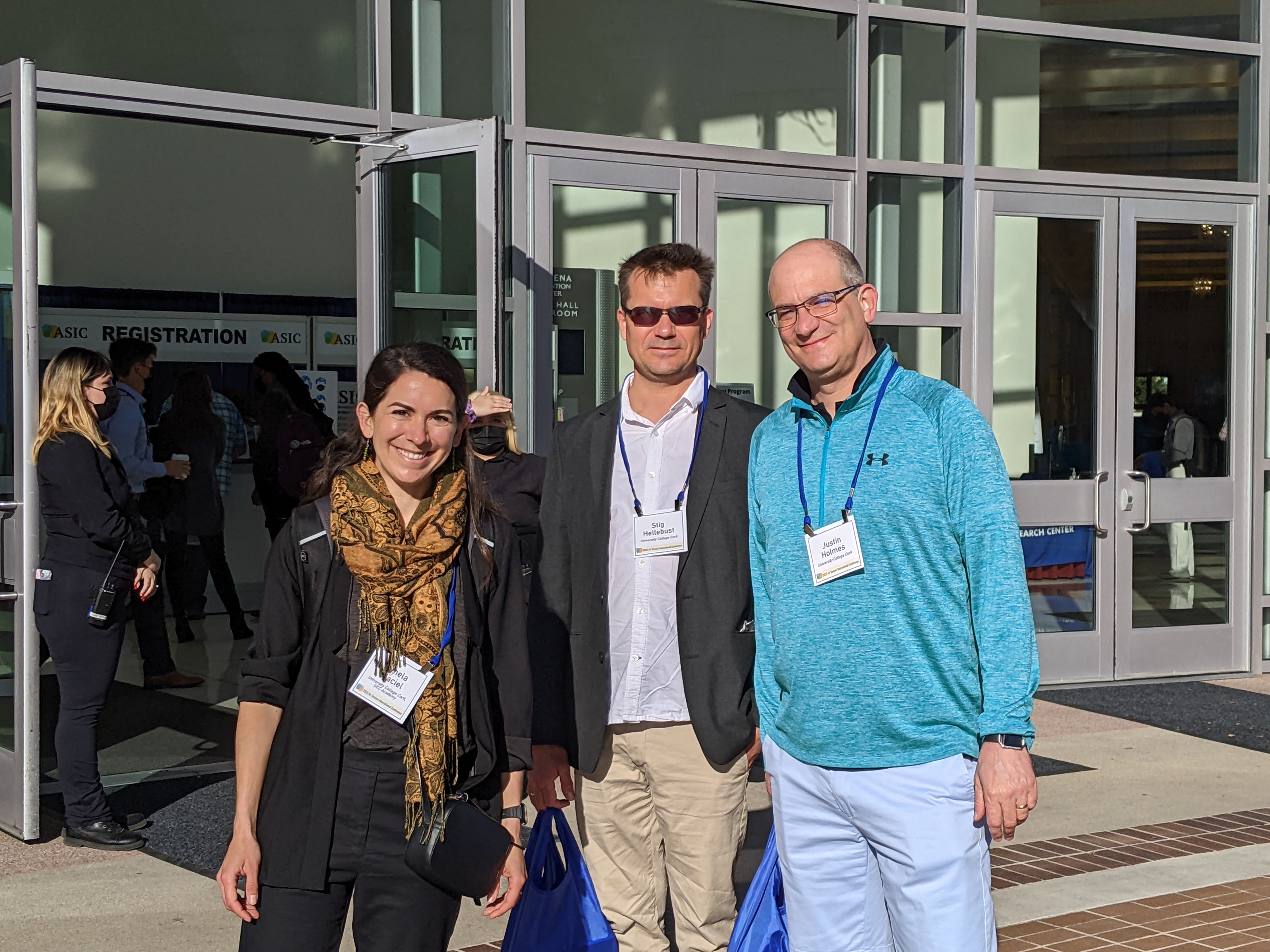
RADICAL project manager Tamela Maciel, atmospheric chemist Stig Hellebust, and RADICAL Coordinator Justin Holmes at the Air Sensor International Conference in California, May 2022.
“Initially the plan was to develop a sensor for free radicals in the air, but after meeting a few air quality companies at conferences, we quickly realized that they had other gases in mind – nitrogen dioxide from traffic fumes, ammonia from industry and agriculture, chlorine, VOCs… And after COVID-19, everyone wanted to measure indoor air quality.
“These ideas formed our sensor development at a time when it could still be shaped, and helped us gain confidence and motivation in the importance of what we were developing. We also organised a few public engagement events closer to home: an 'Air Quality in Cork' public webinar with Cork City Council and a set of air quality demos for Cork Science Festival.”
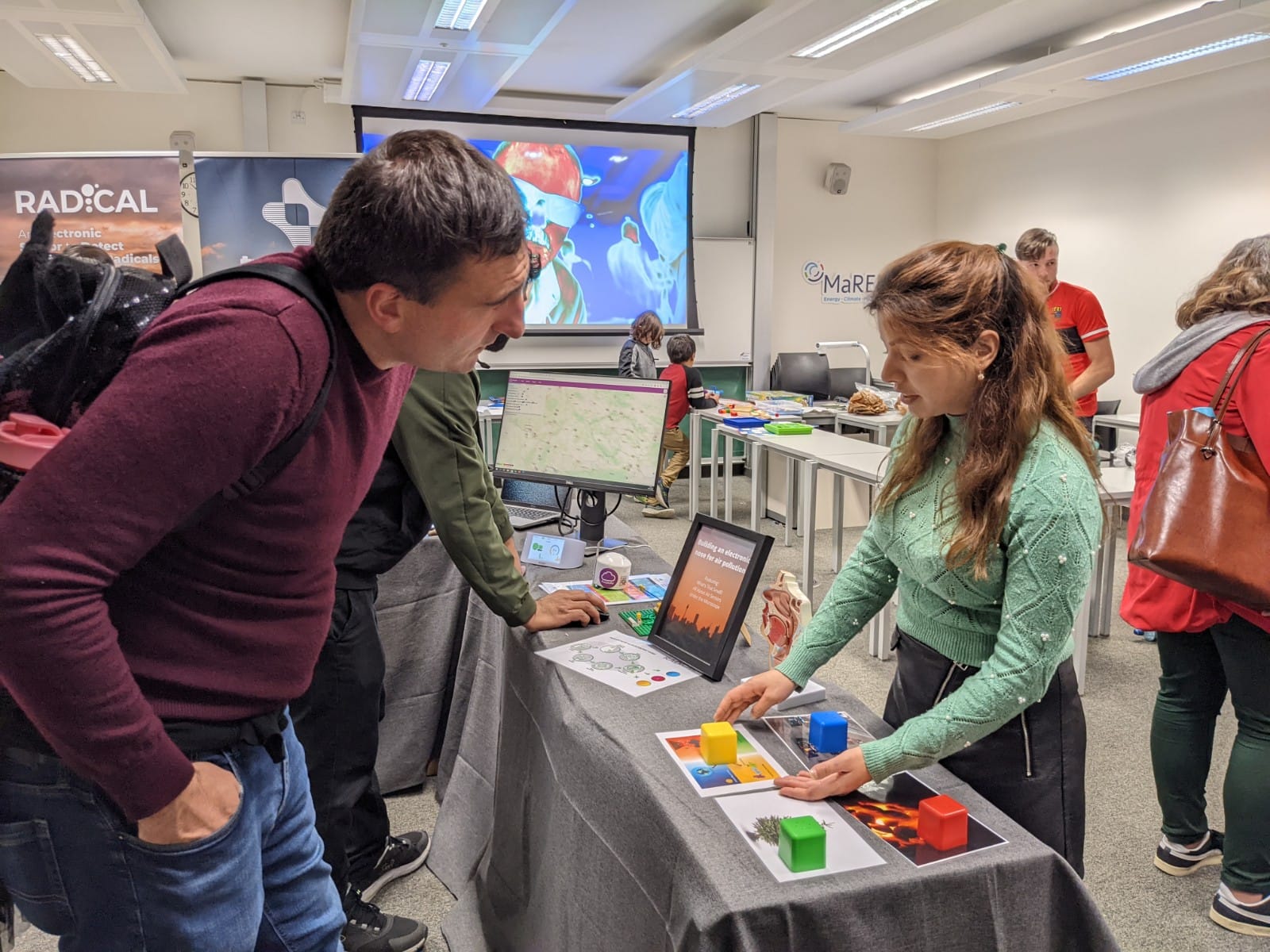
RADICAL PhD researcher Vaishali Vardhan running an air quality demo at Cork Science Festival, Nov 2022.
A working gas sensor
“From 2023 onwards, the RADICAL team had a visible sense of urgency and focus with the clock winding down towards project end. The first gas sensing tests in the UCC atmospheric chamber focused on nitrogen dioxide and ozone and they were a success! We didn't dare breathe as the experiments were repeated, lest the results prove a fluke. But our theories and progress paid off, and suddenly we had a reliable, low-cost sensor on a chip that could be tuned to detect many different gases. The publications started to come out thick and fast and we successfully extended the project deadline by three months in order to make up the lost time from COVID-19.”
Project showcase
“The culmination of RADICAL was our final project event. I worked with my Academy colleagues, at Conference UCC, to organize a public symposium on 'Innovative Measurement Techniques for Trace Gases and Radicals' held here in UCC, Cork in early January 2025, just as the ice and snow threatened campus closure. But miraculously, our 50 atmospheric chemists, materials scientists and air sensor experts turned up from across Europe and joined us for two days of multi-disciplinary talks and round-table discussions.
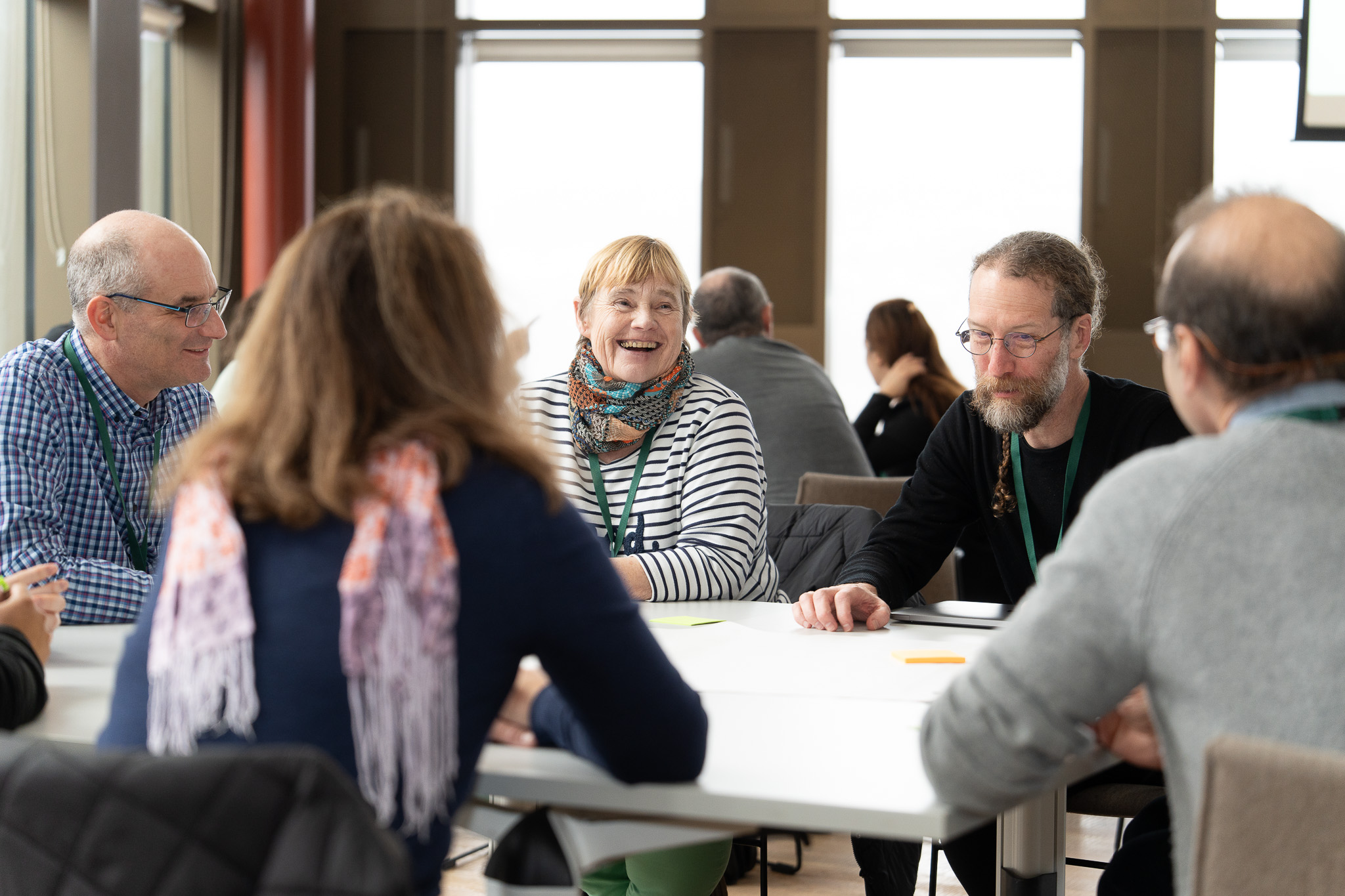
RADICAL symposium round-table discussion.
“The event was a resounding success and I attribute this to its small size (capped at 50), targeted advertising, budget for invited speakers to travel, and generous coffee breaks (both in terms of time and pastries!). Attendees really wanted the chance to talk with each other, not at each other, and that's what we tried our best to design. We were also delighted with the results of a live illustrator who captured our final round-table discussion with both academic precision and comic book humour.
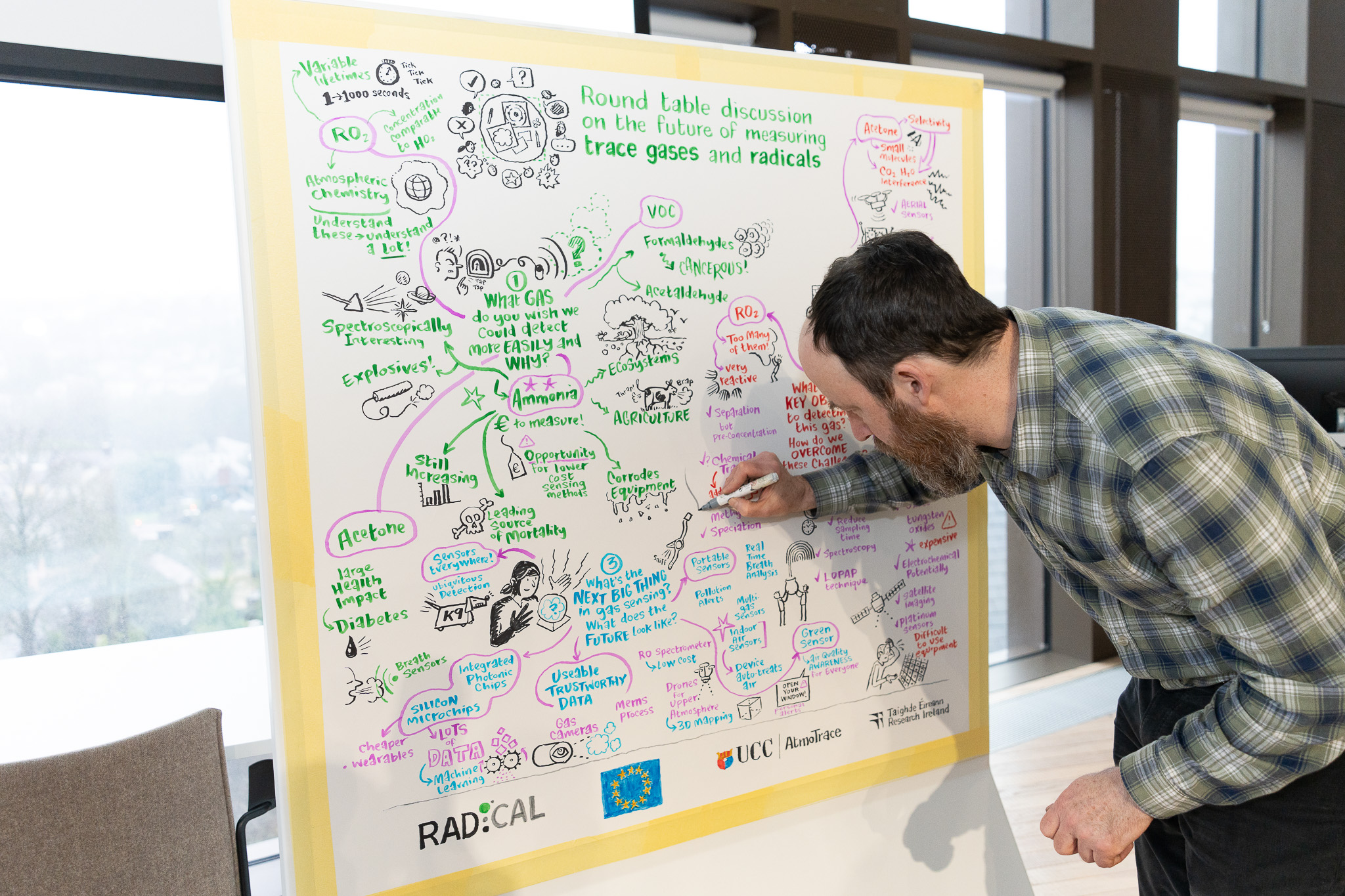
Live illustration from the RADICAL symposium by Philip Barrett, Blackshapes.
“What followed was two months of report writing, culminating in a recent final review meeting, which went extremely well. The EU reviewers praised both the excellent project management and the impressive and impactful dissemination activities throughout the project.”
“And just like that, RADICAL was all over. I'm extremely proud of the role that myself and my Academy colleagues played in the success of this project, but the real credit is due to the coordinator Professor Justin Holmes. His laid-back, friendly approach encouraged collaboration and engagement, across the team. And his scientific acumen was always there to steer the ship.
“I'd feel emotional at this ending, but thankfully Justin has another EU-funded research project on the go, TRANSLATE, and we're delighted to be supporting this project too at UCC Academy.”
Acknowledgements
RADICAL was a collaboration between multidisciplinary partners across Europe including University College Cork (Ireland), HZDR (Germany), University of York (United Kingdom), National Technical University of Athens (Greece), Smartcom (Bulgaria), and UCC Academy (Ireland). The project’s external advisor was Matthew Johnson (DevLabs and University of Copenhagen).
UCC Academy provided Project Management and Communications and Dissemination support from 2020-2025. Tamela Maciel was the Project Manager. Abhisweta Bhattacharjee was the Project Officer. Jonathan Leahy Maharaj was the graphic designer. Nicole McDonagh and Anthony Courtney were the photographers and videographers. Jean O'Callaghan and Sian James provided conference support.
The RADICAL project has received funding from the European Union’s Horizon 2020 research and innovation programme under grant agreement number 899282.
About the author:
Dr Tamela Maciel is a Project Manager at UCC Academy, specialising in research project management and impact. She is the Project Manager for RADICAL and TRANSLATE, and supports on a number of other EU-funded projects managed by UCC Academy. Her background is in astrophysics research, science writing and editing, and public engagement.
UCC Academy
Contact us
UCC Academy DAC, University College Cork, Western Gateway Building 2.02, Western Road, Cork. Registered Charity Number: 20141431 ,
